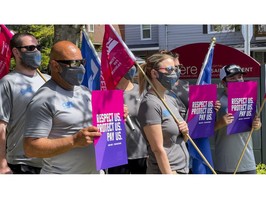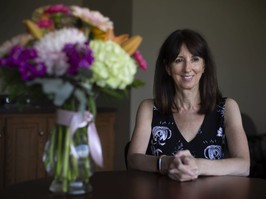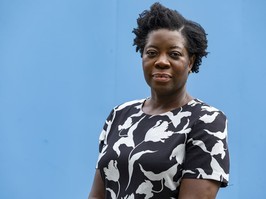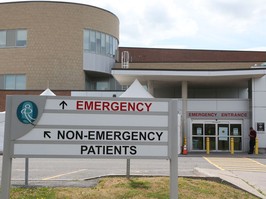b.c. pressed to recognize qualifications of foreign-trained doctors
the province has a doctor shortage, and yet there are hundreds of foreign-trained physicians here who aren’t allowed to practise medicine.
we apologize, but this video has failed to load.
try refreshing your browser, or
tap here to see other videos from our team.
tap here to see other videos from our team.
by: lori culbertdr. harry tabrizi — an ear, nose and throat surgeon who practised medicine for more than a decade in iran before immigrating to canada — now sells hearing aids in surrey.the problem? tabrizi and thousands of other foreign-trained doctors are unable to get approved to work as physicians in british columbia or other parts of canada, despite a significant doctor shortage in this province and elsewhere.“there is a shortage of every (type of doctor) that you can think about in health care. and i’m sitting here, i’m selling hearing aids, basically. i can suture somebody who is bleeding … but he is losing blood and i’m losing my confidence in myself,” tabrizi said.“i think that there are some mismatches between the skills available and the people in need.”since immigrating to canada in 2012, tabrizi has taken and passed nine different tests and exams to prove that his medical qualifications and language skills are proficient enough to be a physician in canada. and he is willing to work in any b.c. location, as he has experience in both the city of tehran and smaller communities.“i worked in a rural area in iran for three years. and i know what rural medicine or remote area practice means. so i would like to go anywhere and provide the services,” he said.this is not a new issue, as many canadians and permanent residents who attended an international medical school have been lobbying provincial governments for years to change the “discriminatory” rules that prohibit the vast majority of them from getting mandatory training spots in hospitals, called residencies. as a result, it is impossible for them to be certified as doctors here.
new campaign
but now there is a new campaign called #equalchance that’s backed by some heavy hitters, with political and financial clout, that hopes to change the rules so that graduates of international medical schools recognized by canada can openly compete for all residency positions. among its backers are the institute for canadian citizenship, a charity co-founded by former governor general adrienne clarkson to promote the inclusion of immigrants, and vancity, which has provided an undisclosed amount of money to the campaign.roberto alvarez, who works for the institute for canadian citizenship and is heading #equalchance, said the inspiration to launch the campaign in may was partly due to the public’s recent reactions to racial injustices, such as the black lives matter movement following the death of george floyd, and partly due to the inequities exposed by the pandemic.“as our country becomes more and more diverse, having doctors that have different experiences, that speak different languages, it’s very beneficial,” said alvarez.“a lot of people feel like there are not enough doctors in their communities. and we have all these doctors waiting on the sidelines that are ready to help.”advertisement

according to public data available from the canadian resident matching service (carms), which places medical school graduates in mandatory residency positions, 90 per cent of the 3,397 training spots in 2020 were earmarked for canadian graduates, leaving just 325 for foreign-trained doctors. that 10-per-cent allotment for physicians trained out of country has been consistent for the last eight years in canada.also according to carms, 1,435 internationally educated doctors who now live in canada applied for those residency positions in 2020, but only 29 per cent got placements.the number of applicants who got placements in 2018 and 2019 was even lower, at just 23 per cent. in comparison, 99 per cent of canadian medical school graduates got one of these required residency positions.according to the carms data, graduates of medical schools in europe were far more likely to be matched with a residency in 2020, compared to those from africa, asia, south america or the middle east.british columbia, according to alvarez, is one of the provinces with the most “unfair” process for international medical professionals.
‘blocked from the get-go’
in 2020, b.c. offered 352 residencies to medical school graduates. but 294 of those, or 84 per cent, were reserved for students who attended canadian or american universities, and the rest were for overseas graduates.and of those 58 training spots for foreign-educated doctors, they were only in four disciplines: 52 spaces in family medicine, and the remaining six spaces were typically spread out between psychiatry, internal medicine and pediatrics.there are a total of 29 disciplines in b.c. in which doctors can choose to specialize, but the vast majority of those are only open to canadian and american graduates.“so you can only imagine if you’re a specialist of any other disciplines, and you’re in british columbia, you’re pretty much blocked from the get-go,” alvarez said.a written statement by the health ministry, sent in response to a series of questions by postmedia, said the number of residency spots open to international medical graduates has drastically increased from six in 2003 to the 58 available today. the ministry did not say whether these numbers would be further expanded.the statement said, though, the ministry has implemented a program for a select number of family doctors who completed a family medicine program outside canada to get a medical licence here in exchange for a two-year commitment to work in a community that needs physicians, which is chosen by a health authority.the ministry also said that in 2020, the college of physicians and surgeons of b.c. proposed an “associate physician” position that, once it is officially created, would allow doctors not deemed eligible for a full licence “to work under physician supervision in acute care settings to increase capacity and service delivery.”foreign-trained doctors “are recognized as crucial contributing physician members of the b.c. workforce, often providing important physician services to british columbians who live in the most rural and remote communities,” the statement said.number of initiatives
the ministry did not directly answer a question about whether rules could be changed to better use these foreign-trained doctors to fill shortages here. however, the statement said the government was trying to address the need for more physicians in b.c. through a number of initiatives, including increasing spaces in the ubc medical school, creating more than 50 primary care networks and opening 24 urgent and primary care centres.“like many jurisdictions, b.c. is challenged by the health-care practitioner shortages across canada, including primary care (family medicine) providers. but our government’s goal is to improve access to primary care,” the ministry said. “we (will) continue recruitment efforts to add to our primary care provider teams and increase capacity.”#equalchance commissioned a survey by leger, which polled 2,540 canadians, and found 70 per cent said there were not enough heath care providers in their communities and 80 per cent said they would be comfortable getting treatment from qualified doctors trained in other countries. both percentages were even higher among responses from british columbians. (the survey was conducted in december and january, and has an approximate margin of error of plus/minus 2.5 percentage points, 19 times out of 20.)a recent analysis of job postings on health match b.c., the province’s recruitment service for doctors, showed 1,024 openings with 868 of them for permanent positions and the rest for locums. the highest number of vacancies were in vancouver coastal health (274) and fraser (256), but when adjusted for population the authorities with the most severe shortages on a per-patient basis were in northern b.c. and on vancouver island, followed by interior health.in the meantime, there are by some estimates more than 1,000 foreign-trained doctors in b.c. who want to practise medicine here. they often get service-industry jobs when they first arrive in canada, although most of them eventually move to some type of job in the medical industry — ones for which they are very overqualified, said alvarez.“receptionists in the hospitals, or they try to be support workers or do administrative work in clinics,” alvarez said.
advertisement
that has been the experience of tabrizi, the ear, nose and throat surgeon. since arriving in canada in 2012, he has volunteered with an agency for immigrants, providing them advice on healthy food and diet; volunteered with the b.c. cancer agency, greeting patients and providing directions in the building; worked as a health-care aide with nurse next door; and now administers hearing tests and sells hearing aids — a job he enjoys and is grateful to have.“but still, i miss my profession, for sure. and i am still not giving up 100 per cent that i can get a spot,” said tabrizi, but he worries that as the years pass by the possibility of securing a residency gets more remote.the good-natured, friendly doctor said he and his wife moved to port moody in 2012 to escape the political situation in iran so their daughter, who was then nine years old, could have a better future.
frustrating reality
tabrizi thought at the time that if he studied hard to pass all the required medical tests and language exams in canada, he would eventually be able to work as a surgeon here. the reality has been frustrating, especially when he hears from his clients that they’ve faced long waits for surgeries that he is qualified to perform.“there was a long wait list even before the pandemic,” he said. “removing the tonsils is a very simple procedure, it’s just a half an hour at most, and people were struggling to have that operation done and they were in the waiting list for more than a year.”tabrizi, who speaks three languages, said he wishes the government had some type of bridging program that would allow foreign-trained doctors to work in some capacity delivering health care, and then work their way up to securing a residency position.postmedia sent questions to the college of physicians and surgeons of b.c., but a spokesperson said it played no role “in determining allocation of residency positions.”
advertisement
dr. matthew chow, the president of doctors of b.c., an association that represents the province’s 14,000 physicians, residents and medical students, said the specialty most in demand in the province right now is family doctors.“it’s very difficult to find a family doctor, in particular, if you live in a greater victoria area, if you live in the lower mainland. it used to be a difficulty mostly centred in the rural and remote areas. but now we’re seeing the opposite, we’re actually seeing city dwellers having the most challenge finding a family doctor,” chow said.he said there are roughly 700,000 to 900,000 british columbians without a family doctor, and that means the province needs between 300 and 500 of them to fill these gaps. “we’ve got to reform the system in a number of different ways to overcome that,” chow said.he argues, though, that there are a sufficient number of training spots available in family medicine in b.c. but for a variety of reasons that include heavy workload and pressure to be experts in so many facets of medicine, very few people — as low as 10 per cent — remain as family doctors, but move on to other disciplines.therefore, he argues, opening up more residency spots to canadian-trained as well as foreign-trained doctors will not solve the shortage challenge. instead, his association is working with the health ministry to try to make family medicine more palatable by, potentially, sharing some of the workload with nurse practitioners and other medical experts.he asked for patience, though, as the solutions to ensure every british columbian has access to a family doctor cannot be achieved overnight. “we’re certainly working together with the government on this. but this is a challenge that has actually developed over decades. it took us decades to get to this point. and so to unravel this, it’s going to take time,” chow said.

advertisement
rosemary pawliuk, a lawyer from metro vancouver, got involved with the society of canadians studying medicine abroad, when her daughter, dr. alexandra brito, could not get a residency placement in canada after completing her medical degree in ireland and achieving top-of-her-class marks.she, instead, was offered a placement at johns hopkins, a prestigious medical centre in maryland, in 2015 and as a result is now working as a surgeon in north carolina, where she is focusing on trauma and intensive care, putting her on the front lines of the u.s.’s fight against covid-19.“if she was allowed to have done her residency training in canada, she would have done it. but she was excluded, so she made a different path,” said pawliuk.it was a disappointing experience for her daughter, who did her undergrad degree at ubc, who chose to go to medical school in ireland to experience a different culture and because it was well-respected. she had no idea how impossible it would be to return to canada, her mother said.
mired in delays
the society, of which pawliuk is now the president, filed a lawsuit in 2018 against the health ministry, the college of physicians and surgeons and other local health-care decision-makers, challenging the obstacles foreign-trained doctors face competing for limited placements. it has been mired in delays and is still slowly making its way through the court, a frustrated pawliuk said.she rejects any argument that the majority of overseas medical schools produce less qualified physicians. but even if that were true, she said, why not open up all residency positions to all applicants, regardless of where they studied, so canadian health authorities could hire the best people for the jobs?according to recent data that the ubc medical school used to make public, pawliuk said roughly 1,000 foreign-trained doctors living in b.c. apply each year for the 58 residency spots that are available to them here. this oversupply of already trained doctors could be an “instant” solution to the doctor shortage, she added.“this past year, health match b.c. held a promotion where they were trying to recruit anesthesiologists and general surgeons because we have a tremendous shortage of those two professions. and yet, not a single residency position (for foreign-trained doctors) was available for anesthesiology or general surgery, despite the government’s acknowledgment of the significant shortage,” pawliuk said.
advertisement
dr. vahid nilforusha was a successful anesthesiologist in iran for 16 years before immigrating to canada in 2010. he applied to residency programs in multiple provinces, including at the university of toronto.“but i was never offered any interviews from them or any other anesthesia residency program in canada. over the years, i was offered some interviews from residency programs in the u.s., though,” nilforushan, who lives in vancouver but is right now visiting iran, said in an email to postmedia.nilforushan could also contribute to b.c.’s concurrent health emergency, the deadly overdose crisis, because he also focused on addiction medicine in iran, where he successfully used an anesthesia method in opioid-addiction treatment.the son of a prominent doctor in iran, nilforushan is frustrated that he has passed all his qualifying exams in canada and still cannot secure a residency position here. he remains hopeful, though, that he will be able to contribute in the future.“i immigrated to canada with my family under an expedited application process for high-demand occupations in 2010. canada was looking for physicians as it recognized it had a physician shortage. now 11 years later, the demand for anesthesiologists is even higher, but i and many other highly qualified immigrant physicians remain unlicensed,” he said in a video posted to youtube last month.“immigrant physicians are canadians, but (we) are treated as second-class citizens. we are denied access to licensing despite proving competence. this is not equality.”lculbert@postmedia.com
 11 minute read
11 minute read





